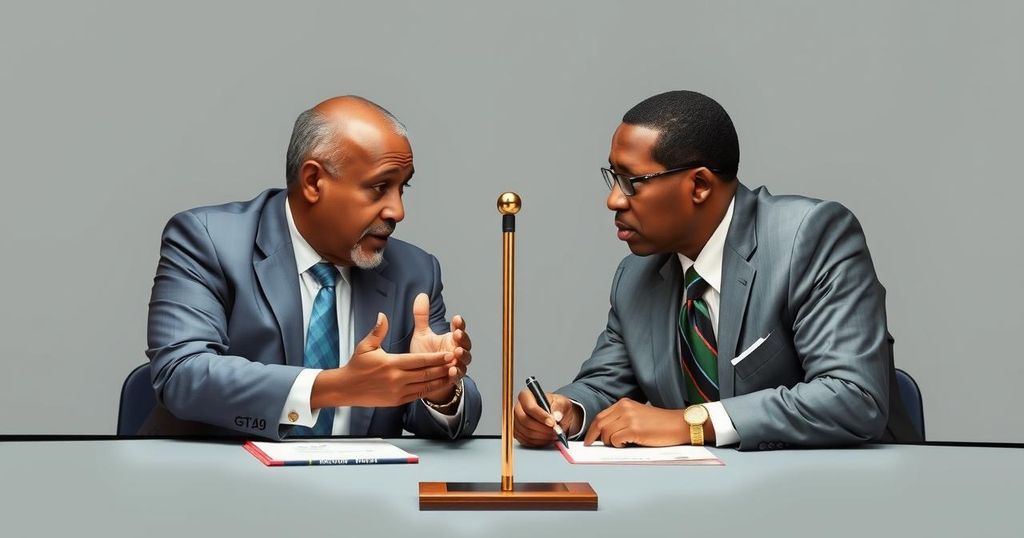Turkey Mediates Landmark Ethiopia-Somalia Peace Agreement
On December 11, 2024, Turkey mediated a historic agreement between Ethiopia and Somalia aimed at reconciling their tensions stemming from Ethiopia’s controversial agreement with Somaliland. The Ankara Declaration reinforces both nations’ commitments to cooperation and territorial integrity. However, challenges loom, including potential nationalist resistance in Somalia and complexities surrounding Somaliland’s international recognition, necessitating sustained commitment and international support for peace in the Horn of Africa.
On December 11, 2024, Turkey achieved a significant diplomatic milestone by mediating an agreement aimed at reconciling Ethiopia and Somalia after heightened tensions that had persisted for nearly a year. This landmark declaration, originating from discussions held in Ankara, illustrates Turkey’s burgeoning influence in the Horn of Africa and has gathered international endorsement from entities such as the United Nations, the United States, and the African Union.
The discord between Ethiopia and Somalia largely stemmed from a contentious Memorandum of Understanding (MoU) that Ethiopia signed with Somaliland in January 2024 regarding the establishment of a naval base on Somaliland’s Red Sea coastline. This development raised alarms in Somalia over potential recognition of Somaliland’s autonomy, which it perceives as a threat to its sovereignty. The resultant breakdown in relations caught the attention of regional powers, with Egypt and Eritrea siding with Somalia, while Ethiopia found support from Uganda and Kenya, heightening tensions in the Horn of Africa.
To resolve this burgeoning crisis, Turkey initiated the ‘Ankara Process’ in July 2024, which involved several rounds of high-level talks. This culminated in the Ankara Declaration, where both nations reaffirmed their commitment to unity and territorial integrity. They agreed to prioritize economic cooperation and initiate negotiations for commercial agreements by February 2025. This agreement is seen as a crucial step for Ethiopia to gain consistent access to the Red Sea, while Somalia benefits from an improved security landscape in the face of internal threats.
However, the agreement may encounter challenges within Somalia, particularly resistance from nationalist groups who may view the reconciliation as a compromise of national sovereignty. Moreover, Somali President Abdirahman’s deepening ties with Ethiopia, compounded by potential U.S. recognition of Somaliland could further complicate the situation. Alternatively, France’s intention to support Ethiopia’s maritime ambitions also introduces additional complexities in the region.
Turkey’s mediation not only enhances its diplomatic profile in Africa but also exemplifies its emerging role as a peacemaker in regional conflicts. The agreement’s success hinges on the commitment from both nations to uphold the terms while managing various domestic and international dynamics. Sustained international support, particularly in light of the allegations regarding violations of the declaration, is crucial for fostering peace and cooperation in the Horn of Africa.
The Ethiopia-Somalia discord has historical roots, primarily stemming from Ethiopia’s decision to engage with Somaliland, an area Somalia considers integral to its national territory. The tensions escalated significantly after Ethiopia’s MoU with Somaliland, causing a diplomatic rift that prompted regional power alignments and conflicts. The geopolitical landscape in the Horn of Africa has been marked by Ethiopia’s desire for Red Sea access and Somalia’s defensive posture against perceived threats to its sovereignty. The reconciliation mediated by Turkey symbolizes a concerted effort to de-escalate tensions and foster cooperation amidst these complexities, while also reflecting broader diplomatic dynamics involving various international actors.
The mediation effort by Turkey, culminating in the Ankara Declaration, represents a critical juncture for both Ethiopia and Somalia, offering a pathway towards stabilizing relations and fostering economic collaboration. However, the journey towards lasting peace in the region is fraught with challenges, including internal dissent in Somalia and international complexities surrounding Somaliland’s recognition. The continuing commitment of the involved nations, alongside international support, will be vital for the realization of the agreement’s objectives and for the broader stability of the Horn of Africa.
Original Source: www.idsa.in




Post Comment